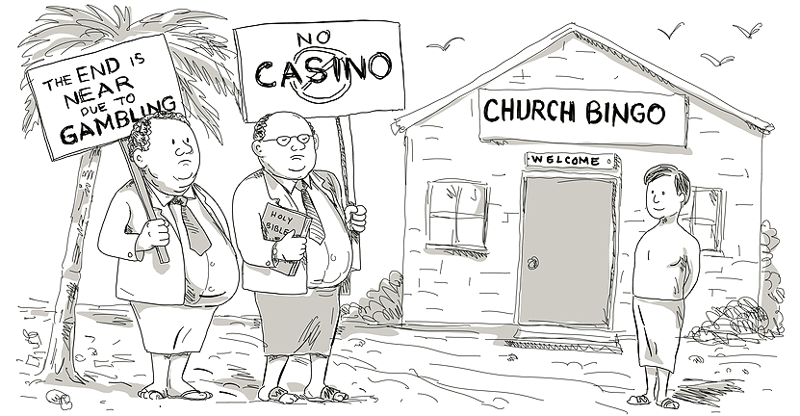 In the majority of cases, people enjoy placing a bet or taking part in another form of gambling because they see it as harmless fun. For most people, the ability to control their gambling habits is an important factor when it comes to their enjoyment of it as an exercise.
In the majority of cases, people enjoy placing a bet or taking part in another form of gambling because they see it as harmless fun. For most people, the ability to control their gambling habits is an important factor when it comes to their enjoyment of it as an exercise.
Of course, just because that is the case for most people doesn’t mean that it is how everyone feels about betting and other forms of gambling. Indeed, there are huge numbers of people out there that have a difficult relationship with gambling and want to avoid it where possible.
With that in mind, it is interesting that so many charities or charitable causes use gambling as a way of raising money. Whether it be the likes of lotteries that you can play for different charities or even something seemingly quite innocent such as a charity casino night, it is relatively common for charitable organisations to use some form of gambling to raise money for their own enterprises.
Is that a totally acceptable thing to happen? Or is it something that we should be aware of as a society and look out for in a more reasonable manner?
It Makes Money

If there’s one thing that we all know about gambling, it is that it is something that makes money. Whether it be bookmakers building their margin into the wagers that they offer or else casinos ensuring that their House Edge is including in every game that punters are able to play, gambling is something that is all but guaranteed to make a profit over the long term for those that offer it.
With that in mind, it is hardly surprising that charities, which exist to raise money in order to help others, might turn to gambling to help raise said money.
As long as the charity in question has chosen their form of gambling wisely and it is set up in the correct manner, they know that they will make a profit during the course of the exercise.
In fact, the nature of gambling is such that they will know exactly how much money it is that they will raise through the process of the gambling tool that they offer, presuming that all possible tickets and so on are sold. The Edge or margin that is built in to the various gambling methods means that it is a given that they will earn a certain amount.
It Appeals To People

Despite what we might think of ourselves, it is generally quite difficult to get people to give to charity. In 2020, for example, 62% of people in the United Kingdom gave to charity either via donation or by sponsorship. The following year, the average monthly donation in the UK was £49. Obviously that’s a solid amount of money, but it isn’t a huge amount when you consider how many charities there are that require our help and you take into account the amount of disposable income that a lot of people in the UK have available to them.
The sheer amount of charities available for people to donate to means that charities have to appeal to us in order to persuade us to donate our money to them rather than to one of the other charities on the market. One way of doing that is by offering people something in return for their money, which makes the idea of giving much more appealing. Though the chance of winning something is slight and the thing that we’ll win is unlikely to be worth huge amounts of money, it is at least something, which appeals to many of us.
The majority of players of any form of gambling know that they are more likely to lose than they are to see some sort of return. With this in mind, punters want to at least get a sense that they’re contributing to something in return for their money. Knowing that you’re helping to raise money for a charity will at least cause bettors to feel as though they’re getting something back for their money, even if it is just a sense of pride rather than a specific thing. The combination of people getting something back and charities raising money is almost too good for them to refuse.
Is It Wrong?

Though the reasoning for the likes of charities and churches to use gambling as a means of raising money is clear, it is fair to ask whether it is right or not. It is estimates that around 430,000 people in the United Kingdom suffer from gambling addiction, with many more on top of that being at risk of developing a problem. With this in mind, is it right that companies and organisations use the world of betting and gambling to raise money for their causes? How many people might suffer a setback because of such charitable fund raising?
Whilst the likes of a a local church’s tombola or raffle might seem like a relatively harmless bit of fun, someone with a gambling addiction might well be triggered by such an event. Similarly, a lottery to raise money for a charity obviously isn’t as appealing as one that can see you win millions of pounds, but it is still gambling and could easily trigger a problem gambler into ‘falling off the wagon’. Spending a few quid for a good cause is still gambling, so it isn’t out of the realms of the possible that someone struggling to control their gambling could return to it as a result.
Whilst we can’t control everything that we do because of other people, it does seem like it is wrong to use something that could cause a form of harm to others as a way of making money for good causes. Even those that are benefitting from the fund raising might well be in a situation where they are uncomfortable to receive money raised through something such as gambling. Given the divisive nature of betting and gambling as an activity, it does seem strange that some charities and other good causes are happy to use it to make money.